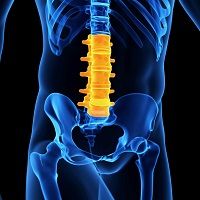Article
Filgotinib Could Be Effective for Treating Ankylosing Spondylitis
Author(s):
A 12-week phase 2 study comparing filgotinib to placebo found the oral, selective JAK1-inhibitor could be an effective treatment for ankylosing spondylitis.

Results of a phase 2 study examining filgotinib suggest the oral therapy could be an effective treatment for active ankylosing spondylitis and an inadequate response to nonsteroidal anti-inflammatory drugs(NSAIDs).
The study, which was presented at the Clinical Congress of Rheumatology (CCR) West 2019 annual meeting in San Diego, CA, found filgotinib demonstrated superior efficacy when compared with placebo over 12 weeks.
Led by Desiree van der Heijde, MD, PhD, of Leiden University Medical Center, an international team of investigators conducted a 12-week, randomized, placebo-controlled, double-blind, study that compared filgotinib in a 200 mg dose to placebo therapy. For inclusion in the study, patients were required to have active ankylosing spondylitis, a Bath Ankylosing Spondylitis Disease Activity Index of 4 or greater with spinal pain also at 4 or greater, and a high-sensitivity CRP level of 3mg/L or greater. All patients must have undergone prior treatment with 2 or more NSAIDs.
A total of 116 patients were included in study and they were randomized in a 1:1 ratio to receive either filogtinib 200 mg or placebo therapy. A total of 107 patients completed the study—with 55 patients completing the study from the filgotinib group and 52 from the placebo group.
Investigators noted that patients with 1 or fewer prior TNF-inhibitor exposure and could continue 1 NSAID/cyclooxygenase-2 inhibitor and 1 conventional synthetic disease-modifying anti-rheumatic drug during the trial.
The primary endpoint was Ankylosing Spondylitis Disease Activity Score change from baseline to week 12. Assessments of disease activity were at baseline and at weeks 1, 2, 4, 8, and 12.
Assessments of disease activity were at baseline and at weeks 1, 2, 4, 8, and 12 —Secondary endpoints included the percentage of patients AS Disease Activity Score clinically important improvement, major improvement, which defined as greater than -1.1 and greater than -2 from baseline, respectively.
Assessments of SpondyloArthritis International Society 20/40/5 of 6/partial remission and change from baseline in Spondyloarthritis Research Consortium of Canada (SPARCC) MRI scores for sacroiliac joint and spine were also included as secondary endpoints of the study.
The mean age of the study population was 42 years, mean years since diagnosis was 7, and 74% of patients were Male. Additionally, mean Ankylosing Spondylitis Disease Activity Score was 4.2, mean MRI SPARCC sacroiliac joint scores was 6.1, and mean SPARCC spine score was 16.5. Investigators pointed out baseline characteristics were similar between both arms of the study.
Upon analyses, investigators observed multiple changes from baseline in the filgotinib group. Changes included increased hemoglobin(5 g/L), decreased platelets (-23 Giga/L). No clinically significant changes were found in NK cell counts.
Additionally, investigators noted increased total cholesterol, which was mainly driven by increased high-density lipoproteins—this culminated in an 11% decrease in low/high-density lipoprotein ratio at week 12 compared to baseline.
This study, “Filgotinib, an Oral, Selective Janus Kinase 1 Inhibitor, is Effective in Patients with Active Ankylosing Spondylitis and Inadequate Response to nonsteroidal anti-inflammatory drugs: Results from a Randomized, Placebo-Controlled, Phase 2 Study ,” was presented at CCR West by Jamie Zagorski, a medical scientist with Gilead Sciences.




